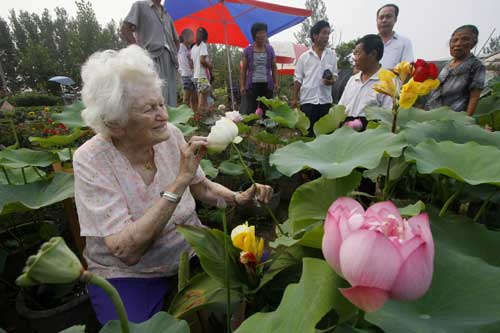China-US
Love for China blooms in heart of American
Updated: 2011-08-11 07:49
By Zhao Ruixue and Ju Chuanjiang (China Daily)
|
Eunice Moe Brock invites her neighbors in Liumiao village, Shandong province, to her garden when the flowers bloom. Photo Provided to China Daily |
Eunice Moe Brock was born in Hebei, and, although she lived in the US for decades, the 94-year-old has returned to China to share her passion for flowers. Zhao Ruixue and Ju Chuanjiang report.
Thanks to Eunice Moe Brock, a 94-year-old grandmother from the United States, flower lovers in Liaocheng, Shandong province, can enjoy displays of irises from that country. "I bought the colorful pink and yellow seeds from a US nursery. I enjoy sharing with others. So I'm very happy seeing the flowers bringing happiness to my Chinese friends," Brock says. The flowers have been planted in her friend Yang Bengui's gardening center in Liaocheng. "Some tourists come exclusively for the American flowers," says Yang, who met Brock at a market.
"He gave me lotus plants from his flower cart," Brock says.
"I invited him to see my garden and we became friends and exchanged flowers," Brock recalls.
"She gave me nearly 100 types of exotic plant seeds, including some from the Thompson and Morgan catalog," Yang says.
Brock lives in Liumiao, a village in Liaocheng, and has government permission to settle permanently. She is honorary president of Liaocheng International Peace Hospital.
"When I moved into my home in Liumiao, I dug up the paving stones and created a garden. The village then gave me a very large area with a well to use as a garden."
Brock says she has planted cosmos flowers, larkspur, daisies, foxglove, Chinese roses and lilies, among other varieties.
"She often invites her neighbors to her garden when the flowers bloom," says Wang Yuqing, 30, who has cared for Brock for 10 years.
"I plant many kinds of flowers which I share with the villagers, some of whom also gave me flowers. It is one way to express my love for the people of China," says Brock, better known as Mu Lin'ai among locals.
Brock's attachment to China dates back to 1917 when she was born in Beidaihe, Hebei province.
Her father, John J. Moe, came to China in 1902 as a Christian missionary.
Two years later, he met Martha Laughlin of the United Kingdom on an ocean liner to China. They married and settled down in Liaocheng, producing four children, the youngest of whom was Brock.
"My parents built a summer cottage in Beidaihe to avoid the heat of summer in Liaocheng," Brock recalls, adding this is where she was principally raised.
Brock left China in 1930, when her parents ended their missionary work in China and returned to the US.
Brock lived with her husband Edwin L. Brock and four children in Colorado, working as a nurse and then became the head of a children's hospital.
"In the US I had a big garden. It seems to me the various varieties of flowers have different characteristics. Beauty is inspirational," Brock says.
During Brock's childhood, China was ravaged by war, poverty and disease, which made a strong impression on her.
"At that time, I was shocked by China's conditions. People were dying of hunger, young girls were forced into prostitution and some parents sold their daughters."
"I was very distressed because I couldn't help. I lived in a warm home (in the US) and people were freezing in the temple next to where I used to live," Brock says, "So I decided to return to China."
"Now I can see great changes have taken place in China. People are enjoying much better lives."
But Brock also has good memories of when she was young and living in China.
She recalls digging wild foxglove from the banks of the Grand Canal and planting them in her small garden.
She also remembers her childhood friendships, such as playing with a Liaocheng local named Zhou Renjie.
To fulfill her childhood dream of "offering help", after her husband died in 1999, Brock sold her US house, 16-hectare forest and all her other possessions and returned to Liaocheng.
She has donated money to local primary schools, hospitals and villages. She spent 20,000 yuan ($3,116.24), for instance, buying computers for the village school.
When Christmas comes, she dresses up as Santa Claus and drives a wooden cart pulled by a donkey to present gifts such as books, stationery and snacks to students. She also volunteers to teach children English.
"Brock is always looking for opportunities to help others. Her optimistic view of life encourages me a lot," Wang says.
Brock's contribution to the local community and her enthusiasm for China have earned her several honors, including the World Peace Prize presented by the World Peace Painting and Calligraphy Committee in 2006, and the "You Bring Charm to China" award, jointly presented by Tianjin Television Station and Hong Kong-based Phoenix Television, in 2009.
Besides planting flowers, Brock says she wakes early every morning, reads books and writes.
She also loves playing electronic games. She even taught a local boy to play chess.
"I consider myself a Chinese woman," Brock says.

Specials

Star journalist leaves legacy
Li Xing, China Daily's assistant editor-in-chief and veteran columnist, died of a cerebral hemorrhage on Aug 7 in Washington DC, US.

Beer we go
Early numbers not so robust for Beijing's first international beer festival

Lifting the veil
Beijing's Palace Museum, also known as the Forbidden City, is steeped in history, dreams and tears, which are perfectly reflected in design.
